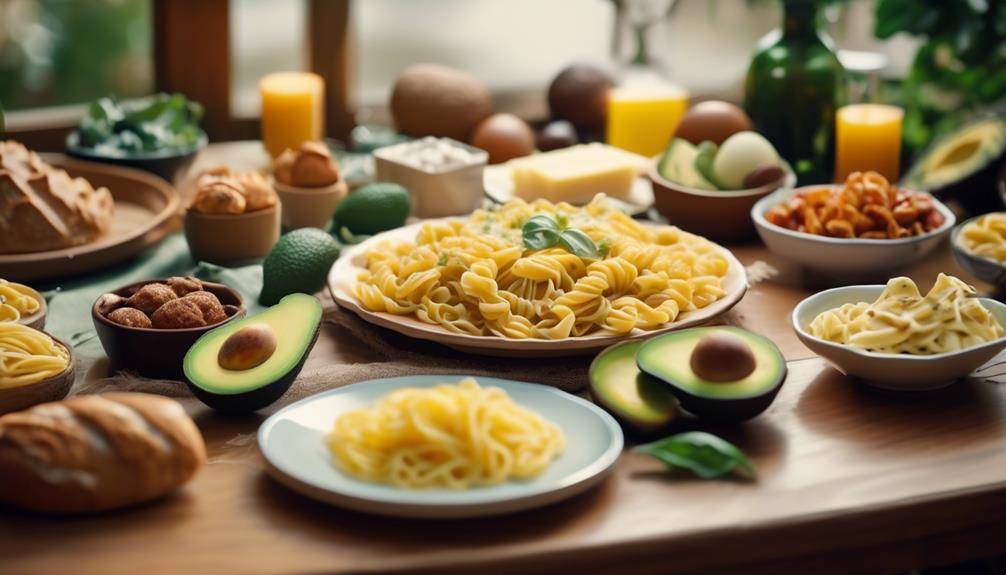Explore Important Foods to Avoid in Ketogenic Diet Principles

Foods to Avoid in Ketogenic Diet: Picture yourself embarking on a journey towards a healthier you, a path where your body becomes a fat-burning machine. But just as every journey has its obstacles, so does the path of a ketogenic diet. On this adventure, there are certain foods that stand in your way, tempting you with their forbidden flavors. In this discussion, we will explore the treacherous terrain of the ketogenic diet, uncovering the foods that must be avoided if you wish to attain the ultimate goal of ketosis. Brace yourself, for the road ahead may be filled with surprises and revelations that will reshape the way you view your meals.
High-Carb Fruits
To maintain a successful ketogenic diet, it is essential to be aware of the high-carb fruits that should be avoided in order to stay in a state of ketosis. While fruits are generally considered healthy, certain ones can be high in carbohydrates, which can hinder your progress on a ketogenic diet. It’s important to remember that the main goal of a ketogenic diet is to keep your carbohydrate intake low and your fat intake high. This helps your body enter a state of ketosis, where it burns fat for fuel instead of carbohydrates.
When it comes to fruits, it’s best to choose those that are low in carbohydrates and have a low glycemic index. Low glycemic fruits have a minimal impact on blood sugar levels, making them suitable for a ketogenic diet. Some examples of low glycemic fruits include berries (such as strawberries, raspberries, and blackberries), avocados, and olives. These fruits are not only low in carbohydrates but also contain beneficial antioxidants and healthy fats.
On the other hand, there are high-carb fruits that should be avoided on a ketogenic diet. These fruits include bananas, grapes, mangoes, pineapples, and oranges, among others. While these fruits may be delicious and nutritious, they are also high in carbohydrates, which can kick you out of ketosis. It’s important to be mindful of your fruit choices and opt for low glycemic fruits instead.
If you have a sweet tooth and miss the taste of fruit, there are alternative sweeteners that can be used sparingly on a ketogenic diet. Some popular options include stevia, erythritol, and monk fruit extract. These sweeteners provide a sweet taste without spiking blood sugar levels or contributing to carbohydrate intake.
Grains and Cereals
Now that you’re aware of the high-carb fruits to avoid on a ketogenic diet, let’s shift our focus to another category of foods that can hinder your progress in ketosis: grains and cereals. While grains and cereals are often considered staple foods, they are unfortunately high in carbohydrates, making them unsuitable for a ketogenic diet. Here are some reasons why you should avoid them and some gluten-free alternatives to consider:
- High carbohydrate content: Grains and cereals, such as wheat, rice, oats, and corn, are rich in carbohydrates. Consuming them can easily kick you out of ketosis and hinder your progress in reaching and maintaining a state of fat-burning.
- Gluten: Many grains, especially wheat, contain gluten, a protein that can cause digestive issues for some individuals. If you have gluten intolerance or celiac disease, it’s essential to steer clear of grains containing gluten. Fortunately, there are plenty of gluten-free options available, such as almond flour, coconut flour, and flaxseed meal, which can be used as substitutes for traditional wheat-based products.
- Alternatives to wheat: Wheat is a common ingredient in various foods, including bread, pasta, and pastries. However, there are numerous alternatives to wheat that you can enjoy on a ketogenic diet. Consider trying out low-carb and gluten-free options like cauliflower rice, zucchini noodles, or almond flour-based bread and pizza crusts.
Sugary Snacks and Desserts
When following a ketogenic diet, it is important to avoid sugary snacks and desserts as they have a high carb content. Consuming these foods can lead to blood sugar spikes, which can disrupt ketosis and hinder your progress. Instead, opt for low-carb alternatives or satisfy your sweet tooth with keto-friendly options to stay on track with your goals.
High Carb Content
You should avoid consuming sugary snacks and desserts that have a high carb content while following a ketogenic diet. These foods can derail your efforts to maintain a state of ketosis, where your body burns fat for fuel instead of carbohydrates. Here are two reasons why you should steer clear of these high-carb treats:
- Reduced fiber intake: Sugary snacks and desserts are typically low in fiber, which is an essential nutrient for digestive health. A ketogenic diet already limits the intake of fruits, whole grains, and starchy vegetables, which are all good sources of fiber. By indulging in high-carb treats, you further reduce your fiber intake, potentially leading to constipation and other digestive issues.
- Diminished weight loss benefits: One of the main reasons people follow a ketogenic diet is for its weight loss benefits. Consuming sugary snacks and desserts that are high in carbs can spike your blood sugar levels and disrupt your body’s fat-burning process. By avoiding these treats, you can maintain stable blood sugar levels and continue to reap the weight loss benefits of the ketogenic diet.
Blood Sugar Spikes
Consuming sugary snacks and desserts can lead to spikes in blood sugar levels, which can disrupt the body’s fat-burning process while following a ketogenic diet. It is important to understand the role of blood sugar management and the glycemic index when making food choices. The glycemic index is a scale that ranks how quickly carbohydrates in food raise blood sugar levels. Foods with a high glycemic index quickly raise blood sugar levels, while foods with a low glycemic index have a slower and more controlled impact.
Sugary snacks and desserts are typically high in carbohydrates and have a high glycemic index, causing a rapid increase in blood sugar levels. This sudden surge in blood sugar can hinder ketosis, the state in which the body burns fat for energy. To maintain optimal fat-burning, it is advisable to avoid sugary snacks and desserts and opt for low-carb alternatives that are compatible with a ketogenic diet.
Ketosis Disruption
To maintain optimal fat-burning while following a ketogenic diet, it is crucial to steer clear of sugary snacks and desserts that can disrupt ketosis. These indulgent treats may taste delicious, but they can have negative effects on your health and hinder your progress on the ketogenic diet. Here are two sub-lists to help you understand the health implications of consuming sugary snacks and desserts:
Negative effects:
- Spikes in blood sugar levels: Sugary snacks and desserts can cause a sudden surge in blood sugar, leading to a crash in energy levels and cravings for more sugar.
- Increased risk of weight gain: These treats are often high in calories and low in nutrients, which can contribute to weight gain and hinder your weight loss goals.
Health implications:
- Insulin resistance: Frequent consumption of sugary snacks and desserts can lead to insulin resistance, a condition that can increase the risk of developing type 2 diabetes.
- Inflammation: High sugar intake can trigger inflammation in the body, which is linked to various health problems, including heart disease and obesity.
Starchy Vegetables
Starchy vegetables, such as potatoes and corn, should be limited or avoided in a ketogenic diet due to their high carbohydrate content. While these vegetables may be a staple in many diets, they can hinder your progress in achieving ketosis, a metabolic state where your body burns fat for fuel instead of carbohydrates.
When following a ketogenic diet, it is important to find nutritional alternatives to starchy vegetables that are low in carbohydrates but still provide essential nutrients. Non-starchy vegetables like broccoli, cauliflower, and spinach are excellent options as they are low in carbs and high in fiber, vitamins, and minerals. These vegetables can be enjoyed raw in salads or cooked in various ways to add flavor and texture to your meals.
Cooking tips for non-starchy vegetables include roasting, grilling, or sautéing them with healthy fats like olive oil or coconut oil. This will enhance the taste and make them more satisfying. You can also experiment with different seasonings and spices to add variety to your meals.
Another alternative to starchy vegetables is incorporating low-carb substitutes like zucchini noodles or cauliflower rice. These can be used in place of traditional pasta or rice to create keto-friendly versions of your favorite dishes. They are not only low in carbs but also provide additional vitamins and minerals.
Processed Meats
Processed meats should be limited or avoided in a ketogenic diet due to their potential negative impact on your health and progress towards ketosis. While they may be convenient and tasty, processed meats are often high in unhealthy additives and preservatives that can hinder your ketogenic journey. Here are some reasons why you should consider cutting back on processed meats and some alternatives to enjoy instead:
- Negative health effects:
- Processed meats are typically high in sodium, which can lead to increased blood pressure and water retention.
- They often contain added sugars, which can disrupt your body’s ability to maintain ketosis and promote weight gain.
- Processed meats are also linked to an increased risk of various health issues such as heart disease and certain types of cancers.
- Alternatives to processed meats:
- Opt for fresh, unprocessed meats such as chicken, turkey, beef, or pork. These options are generally lower in unhealthy additives and provide essential nutrients.
- Explore plant-based protein sources like tofu, tempeh, or seitan. These alternatives are not only keto-friendly but also offer various health benefits.
- Incorporate fatty fish like salmon, mackerel, or sardines into your diet. They are rich in omega-3 fatty acids, which support heart health and reduce inflammation.
Sugary Beverages
Reducing or eliminating sugary beverages from your ketogenic diet is essential for maintaining ketosis and achieving your health and weight loss goals. Sugary drinks, such as soda, fruit juice, and sports drinks, are loaded with added sugars, which can quickly spike your blood sugar levels and kick you out of ketosis. These beverages are not only high in carbohydrates but also lack essential nutrients, making them detrimental to your overall health.
Sugary beverages have been strongly linked to weight gain and increased risk of obesity. When you consume sugary drinks, your body rapidly absorbs the sugar, leading to a surge in insulin production. Insulin is a hormone that regulates blood sugar levels and promotes fat storage. The excess sugar gets converted into fat and stored in your body, contributing to weight gain. Furthermore, sugary drinks do not provide a feeling of fullness and can lead to overconsumption of calories, further worsening weight management.
If you’re looking for alternatives to sugary drinks in your ketogenic diet, there are several options that can quench your thirst without sabotaging your ketosis. Water should be your go-to beverage, as it is calorie-free and essential for hydration. You can also try unsweetened tea or coffee, which can provide a flavor boost without the added sugars. Sparkling water or mineral water can add a refreshing fizz to your drinks without any carbohydrates or calories.
Legumes and Beans
Legumes and beans, while often perceived as healthy sources of protein and fiber, may not be suitable for a ketogenic diet due to their higher carbohydrate content. Although they do provide nutritional value, the carbohydrate content in legumes and beans can easily exceed the daily allowance for a keto diet, making it difficult for your body to stay in a state of ketosis. Here are some reasons why legumes and beans may not be ideal for a ketogenic diet:
- High in carbohydrates: Legumes and beans are rich in carbohydrates, which can hinder your body’s ability to enter ketosis. Just one serving of legumes or beans can contain a significant amount of carbohydrates, making it challenging to maintain a low-carb diet.
- Limited protein-to-carb ratio: While legumes and beans are good sources of protein, their protein-to-carb ratio may not be ideal for a ketogenic diet. To effectively follow a ketogenic diet, it’s important to focus on consuming foods with a higher protein-to-carb ratio.
If you’re following a ketogenic diet and looking for alternative protein sources, there are several options you can consider:
- Meat and poultry: Lean cuts of meat and poultry are excellent sources of protein and are low in carbohydrates. They can easily fit into a ketogenic diet and provide essential nutrients like iron and B vitamins.
- Seafood: Fish and seafood are not only rich in protein but also contain healthy fats like omega-3 fatty acids. Incorporating seafood into your ketogenic diet can offer a wide range of nutritional benefits.
Alcohol
Alcohol consumption can significantly impact your progress on a ketogenic diet. While it is not completely off-limits, it is important to consume alcohol in moderation and make smart choices when it comes to keto-friendly cocktails.
Alcohol contains empty calories and can hinder your body’s ability to burn fat for fuel. When you consume alcohol, your liver prioritizes metabolizing it over burning fat. This can slow down your progress and make it harder for you to reach ketosis, the state in which your body is burning fat for energy. Additionally, alcohol can lower your inhibitions, making it more likely for you to indulge in high-carb foods that are not part of the ketogenic diet.
If you choose to drink alcohol while following a ketogenic diet, it is important to do so in moderation. Limit your consumption to one or two drinks per occasion, and choose options that are low in carbs and sugar. Stick to clear spirits like vodka, gin, or tequila, as they have zero carbs. Avoid sugary mixers and opt for soda water or diet soda instead. You can also enjoy a glass of dry wine or light beer, but be mindful of the carb content.
When it comes to keto-friendly cocktails, there are several options you can explore. Try mixing your favorite clear spirit with soda water and a squeeze of lemon or lime for a refreshing low-carb drink. You can also experiment with sugar-free syrups and extracts to add flavor without the added carbs. Just remember to enjoy these cocktails in moderation and always be mindful of your overall alcohol consumption.
Foods to Avoid in Ketogenic Diet: Frequently Asked Questions
Can I Consume Any Fruits on a Ketogenic Diet?
You should avoid consuming most fruits on a ketogenic diet. Fruits tend to be high in carbohydrates, which can make it difficult to stay in ketosis. However, small portions of berries can be enjoyed in moderation.
Are There Any Grains or Cereals That Are Allowed on a Ketogenic Diet?
Grains and cereals are not recommended on a ketogenic diet. They can have a negative impact on ketosis due to their high carbohydrate content. It’s best to avoid them to maintain the state of ketosis.
Can I Have Desserts or Snacks That Are Sweetened With Artificial Sweeteners on a Ketogenic Diet?
Yes, you can have desserts or snacks sweetened with keto-friendly sweeteners on a ketogenic diet. There are alternatives to artificial sweeteners, such as stevia, erythritol, and monk fruit, which won’t disrupt ketosis.
What Are Some Examples of Starchy Vegetables That Should Be Avoided on a Ketogenic Diet?
You should avoid starchy vegetables on a ketogenic diet. Instead, look for alternative sources of carbohydrates like leafy greens, cauliflower, and zucchini. These options will help you stay in ketosis and maintain your weight loss goals.
Can I Consume Any Type of Alcohol While Following a Ketogenic Diet?
Yes, you can consume alcohol while following a ketogenic diet. However, it’s important to be mindful of the impact of alcohol on ketosis. Alcohol can slow down the fat burning process and may hinder your progress.
Conclusion
In conclusion, following a ketogenic diet requires avoiding high-carb fruits, grains, sugary snacks, starchy vegetables, processed meats, sugary beverages, legumes, beans, and alcohol. These food choices are not compatible with the principles of the ketogenic diet, which focuses on low-carb, high-fat, and moderate protein intake. By avoiding these foods, individuals can better achieve and maintain a state of ketosis, leading to potential weight loss and other health benefits.








